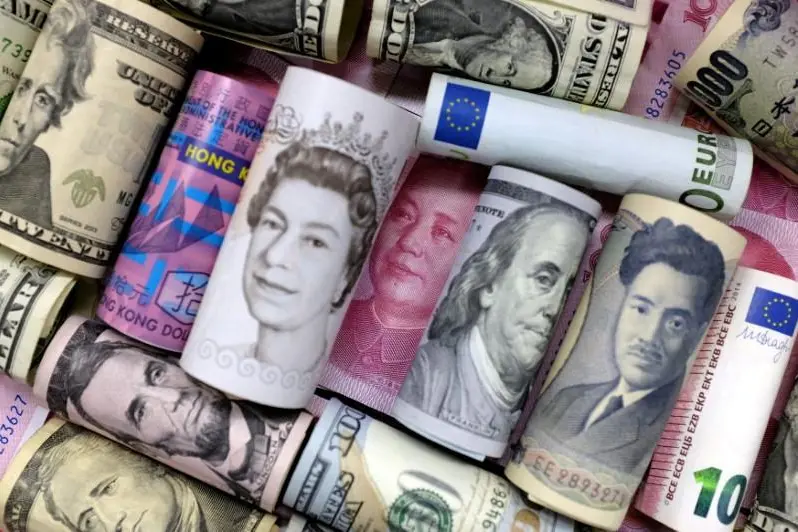PHOTO
LONDON - Foreign exchange markets appear convinced that a global trade war is unlikely to break out anytime soon, although with long bets on some currencies at record highs,investors fear complacency may be setting in.
While the Trump administration's threat to slap tariffs on Chinese imports has heightened fears of retaliation from Beijing, it has only mildly rattled markets enjoying a multi-year rally as global economic growth picks up.
The finance ministers of the 20 big world powers meet for a key G20 summit on Monday. Currency managers are keen to see whether diplomacy breaks out or disagreements deepen between the U.S. and others in the wake of U.S. President Donald Trump's announcement on imposing tariffs on steel and aluminum imports.
Currencies don't like trade spats. President Obama's relatively narrow tariffs on Chinese steel in May 2016 saw the dollar index <.DXY> fall more than 2 percent over a month. Against the yuan, it rose 2 percent <CNY=>.
Similarly, within three months of President George Bush's March 2002 tariffs on EU steel imports, the dollar declined 6 percent.
The latest trade skirmishes come as global currency volatility slips back after a February spike off multi-year lows. It remains below levels seen in recent months, according to a Deutsche Bank volatility gauge. <.DBCVIX>
That leaves investors looking for early warning signs in currency markets that a broader shake-up of prices is coming.
Some currencies have moved as one would expect when smooth trade is under threat: The Canadian dollar has weakened and the Japanese yen has firmed, but the moves have for themost part been limited.
"The talk of trade wars at the moment is just that, talk. It's such a difficult thing to quantify it appears as if the market is just ignoring it," said Russell Silberston, a currencies manager at Investec Asset Management, which manages about $140 billion in assets.
"But don't get me wrong, we've got it (the prospect of a trade war) down as a key event risk."
Currency repercussions should a trade war materialize would be significant because low volatility levels have driven investors to embrace higher-risk strategies. Speculative positions in emerging market currencies, for instance, stand at multi-year highs.
"I'm still amazed by the lack of a reaction in Asian currencies. They must be waiting for the Chinese retaliation," said Richard Benson, co-head of portfolio investments at Millennium Global, a currency investment manager in London.
"There would be quite meaningful moves. We are talking about Asian currencies that are at their strongest for years. There is zero of this (the risk of protectionism) priced in," he said.
(Graphic: FX volatility - http://reut.rs/2pfHuaa)
Benson believes big Asian exporters are most at risk, including the South Korean won <KRW=> and the Taiwanese dollar <TWD=> as well as the Australian dollar <AUD=> - a proxy for Asian economic growth.
The won and the Singapore dollar <SGD=>, another currency exposed to global trade flows, are trading near their strongest levels against the dollar in more than three years.
Among developed world currencies, Sweden's crown <EURSEK=> is tipped by some for a tough time - ING strategists point out Sweden is the second-most open economy in the G10 group of rich countries based on a ratio of trade and economic output.
Bank of America Merrill Lynch sees the Canadian dollar <CAD=> most at risk, while the U.S. and New Zealand dollars also look vulnerable. The Swiss franc and euro would emerge stronger, they said.
DOLLAR DILEMMA
Much of the confidence that the world will ride out Trump-inspired tariffs is because a sustained rebound in trade has buoyed growth, with the global economy set to expand at its fastest pace in six years.
While governments often move to protect local industry when growth is struggling, any Trump tariffs will come at a time when the world's biggest economic engines - the United States, Europe and China - are booming.
Another explanation for the currency calm is that many market watchers do not believe Trump will follow through on his threats. David Bloom, head of global currency research at HSBC, is convinced U.S. officials may find a weaker dollar an easier solution in their bid to slash the huge U.S. trade deficit.
So what does rising protectionism mean for the dollar?
In the short-term, the dollar is likely to weaken, especially against the euro and yen. But should global growth tank or markets sink into a broader sell-off, the dollar should benefit from its status as a global reserve currency.
RISING YEN
Investors are at least convinced about one winner: the yen, backed by a huge current account surplus and its reputation as a safe-haven thanks to the trillions of dollars that Japanese investorshave poured into overseas assets.
"If there is a trade war, the yen is the safe-haven currency of choice," said Manuel Oliveri, an FX strategist at Credit Agricole.
The yen has gained 6 percent so far this year and is near a 1-1/2 year high versus the dollar thanks in part to bets that the Bank of Japan will pull the plug on its massive bond-buying program.
(Graphic: Current account balance, % of GDP - http://reut.rs/2HERLUk)
BlackRock, the world's biggest money manager, has studied immediate market reactions around six major trade risk events in the last 15 years and concludes that gold and the yen tend to outperform.
In a note, they called a trade war "arguably the most disruptive" market risk for 2018.
(Additional reporting by Richard Leong in NEW YORK and Swati Pandey in SYDNEY; Graphic by Ritvik Carvalho in LONDON; Editing by Hugh Lawson)
© Reuters News 2018





















